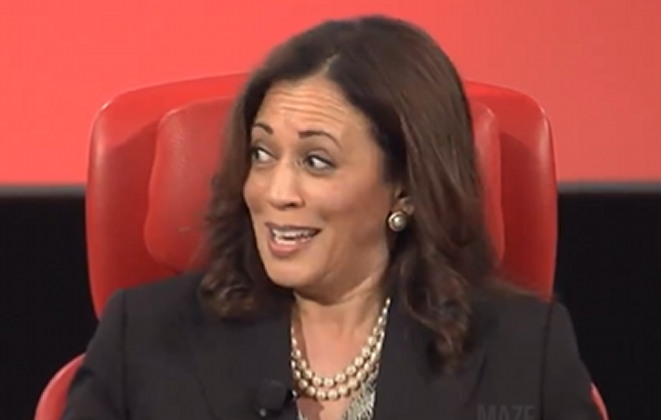Even high schoolers know that the latest policy promised by the Kamala Harris campaign won’t work.
Why? Because that policy — price controls — has never worked at any time in history.
Harris is gearing up to announce her potential administration’s economic agenda on Friday.
Early reports revealed that central to that agenda will be a federal ban on what her campaign calls “corporate price gouging” on food and groceries, according to ABC News.
Of course, freedom-loving Americans know that “price gouging” is really just the natural way prices adjust to sudden rising demand, costs or other economic realities.
Putting an artificial cap on those price changes doesn’t magically make everything better.
Instead, doing so leads to shortages. If prices are rising because of a disaster, for example, that is because supply is limited. High prices in these cases serve to ration goods, so more of them are available to more people.
If the price of a good you need (or desperately want) during an emergency is high, only those who need/want it the most will pay that high price.
When these prices are held at an artificially low level, consumers buy in bulk, and purchasers buy in bulk. Those who don’t even really need much see the rising demand and buy as much as they can.
So-called “price gouging” during times of disasters also helps businesses recoup the incredibly high cost of bringing in and maintaining supply under such conditions.
Price controls don’t work any better as a remedy for Bidenflation.
Why? Because, despite what the term “price gouging” suggests, businesses aren’t just arbitrarily upping their prices because they all-of-a-sudden became more greedy.
They’re upping their prices because rampant government spending and supply-constricting regulations are ramping up inflation.
It doesn’t take an economist to realize what Harris doesn’t about prices. Even common-sense high schoolers know better.
On Thursday, common-sense libertarian journalist John Stossel released a video showcasing students explaining why price control laws never work.
Harris set to propose a ban on price gouging.https://t.co/UhBLb0RHPx
Sad her 1st big policy announcement is economically illiterate.
“Gouging” didn’t cause inflation, Biden’s spending did.
Her naive staff could learn from these @EductionSITC students why “gouging” is good. pic.twitter.com/8cYSl8KfWK
— John Stossel (@JohnStossel) August 15, 2024
“Are you smarter than a politician? The answer is ‘yes’ if you are among the millions of students who, thanks to the charity run by this high school teacher, get to watch my videos in class,” Stossel said.
The charity mentioned by Stossel, Stossel in the Classroom, equips students with educational videos crafted by Stossel, featuring common-sense approaches to thinking, economics and issues of government.
“In modern days, countries like Venezuela suffer from the fact that their governments continue to place price controls on all items,” one high schooler in Stossel’s program said.
“As I did more and more research, I was like, ‘OK, maybe price gouging isn’t such a bad thing,’” another high schooler said.
“If you look at the economics, the most people are helped if you keep the government out of it,” said another, who won a high school essay contest with her argument.
But it’s not just conservatives and common-sense high schoolers calling Harris out.
Even some on the left are noting how terrible this proposal would be.
The Washington Post, an outlet with a well-documented far-left editorial bias, published an Op-Ed decrying the campaign move.
The Op-Ed’s title didn’t exactly hold back — “When your opponent calls you a ‘communist,’ maybe don’t propose price controls,” it read.
The blunt one-sentence summary following the headline put it best: “It’s hard to exaggerate how bad Kamala Harris’s price-gouging proposal is.”
This article appeared originally on The Western Journal.
The post HS Students Embarrass Harris, Point Out Critical Error in Her Central Campaign Promise appeared first on The Gateway Pundit.
This article may have been paraphrased or summarized for brevity. The original article may be accessed here: Read Source Article.





![President Trump Gives Barron A Shout Out At Inaugural Parade: His Unexpected Response is Pure Gold! [VIDEO] president-trump-gives-barron-a-shout-out-at-inaugural-parade:-his-unexpected-response-is-pure-gold!-[video]](https://news.lateawakening.com/wp-content/uploads/2025/01/35545-president-trump-gives-barron-a-shout-out-at-inaugural-parade-his-unexpected-response-is-pure-gold-video-100x70.jpg)



